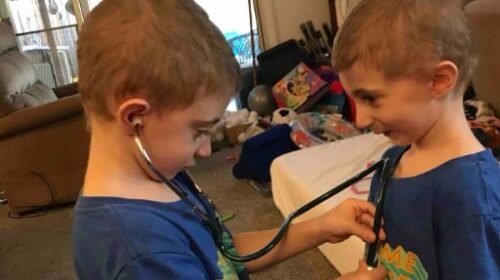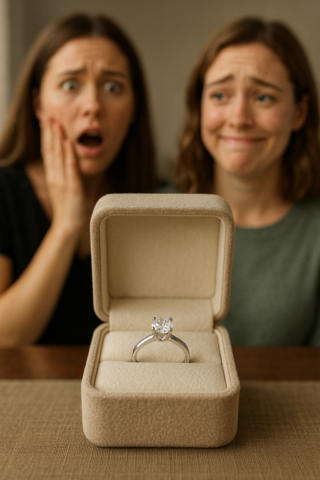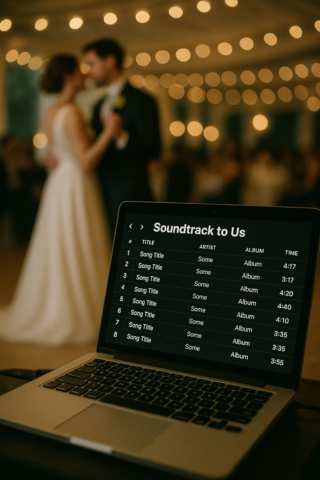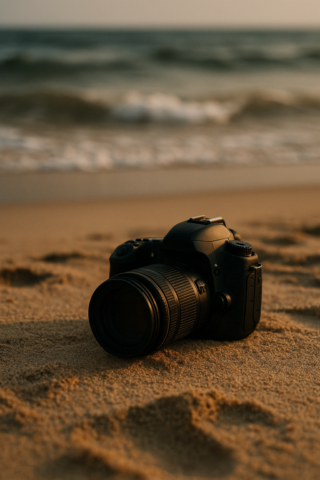We didn’t even have to say the word out loud.
The symptoms had been creeping in slowly—tired more than usual, bruises that didn’t make sense, that pale tint in his cheeks I kept trying to explain away as “bad lighting.”
Then came the bloodwork. The whispers behind doors. The hospital brochure that somehow made it real.
Leukemia.
I was still trying to wrap my head around it when I walked into the living room and saw them like this—matching shirts, toys scattered everywhere, cartoons playing in the background like nothing had changed.
But something had changed. The world felt as though it had tilted off its axis, and I was clinging desperately to what little stability I could find. My son, Leo, sat on the couch with his twin, Noah, who was sitting so close he was almost a part of him. Noah had his arm around Leo’s shoulders, a protective gesture that seemed far beyond his six years.
I stood there, silently watching the two of them, the bond they shared so deep that it almost hurt to witness it in the face of such an awful truth.
“You’ll be okay, Leo,” Noah said softly, his voice too grown-up for a child his age. “I’ll make you better. I know I can.”
I blinked back tears, not sure what to say. How could I explain to Noah that sometimes, no matter how hard we try, we can’t fix things? Especially not something like this.
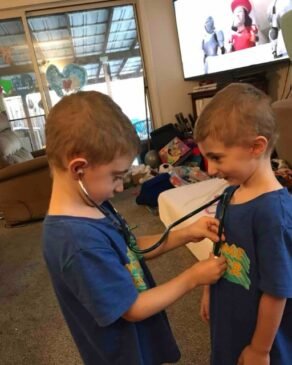
Leo had always been the livelier twin, the one who could light up a room with his energy. But now, he was quieter. Slower. A shadow of the boy I used to know. He gave Noah a tired smile, his usual exuberance replaced by something much softer, almost resigned.
“I’ll be okay, Noah. You don’t have to fix me,” Leo whispered, reaching out to pat his brother’s hand.
Noah, though, didn’t seem to hear him. His tiny brow was furrowed in determination as if he were preparing to launch into action. He always had this need to help, to make things right when the world felt wrong. But this time, I wasn’t sure what he could do.
“I will, Leo. I just need to think about it,” Noah insisted.
I sat beside them on the couch, my mind still grappling with the word “leukemia” and everything that came with it. The treatment plan, the hospital visits, the endless uncertainty. How would I tell Leo’s teachers? How would I explain it to our family? And most of all, how could I keep my boys’ worlds from completely falling apart?
Noah was staring at his twin, his mind clearly racing with some plan he had yet to form. I knew that look. It was the same look he wore when he would try to solve a puzzle in record time or figure out how to fix a broken toy. He was determined, and in his young mind, there had to be a way to make everything better.
“I just need to fix the blood,” Noah muttered, almost to himself. “That’s what’s wrong, right? I can fix it. Just need to make it better.”
My heart broke. How could I explain to him that blood couldn’t simply be “fixed”? That this wasn’t like a scraped knee or a bruised finger? How could I explain to him that sometimes, life didn’t have a solution, no matter how hard we tried to fix it?
I felt the sharp sting of tears in my eyes but held them back, trying not to cry in front of my boys. I couldn’t let them see me fall apart.
“You can’t fix it, Noah,” I finally whispered, my voice breaking. “You can’t fix this.”
Noah looked at me, his face softening with confusion. He was so young, so innocent, and yet, he was already facing a reality far too complicated for him to grasp. “But… I have to fix it. I can’t just sit here and do nothing.” His little voice trembled, and I realized how deeply this was affecting him, even if he didn’t fully understand the implications.
“Sometimes,” I said, my voice faltering, “we can’t fix things. But that doesn’t mean we can’t help, or be there, or love someone. We just have to be strong in other ways.”
Leo’s tired eyes were now fixed on his brother, and for the first time, I saw a glimmer of something in his gaze—something that made me believe, just for a moment, that maybe there was a way through this. His hand reached out to Noah, who immediately grasped it with both of his own, holding it as if he were afraid to let go.
“I’ll be strong for you, Leo,” Noah said quietly, his voice thick with emotion. “We’ll be strong together.”
It was the beginning of something I hadn’t expected—something beautiful in the face of such tragedy. Despite the diagnosis, despite the fear and the uncertainty, Noah was offering something more powerful than any medicine or treatment could provide. He was offering his heart, his unwavering loyalty to his twin brother, and his love.
In the following days, Noah continued to try and “fix” the situation in his own way. He would pick out different “treatments” from his toy doctor kit, bringing them to Leo as if they could magically heal him. But instead of becoming frustrated or upset, Leo took it all in stride, playing along with Noah’s attempts to be the hero. And in his own way, Noah was becoming one—not by finding a cure, but by being there, by showing up every day with his unconditional love and determination.
I, on the other hand, started to find my own way of coping with the situation. I focused on creating a sense of normalcy for both of them. We played board games, baked cookies, and spent hours coloring together. We didn’t talk about the hospital visits or the treatments unless we had to. Instead, we just lived in the moment, holding onto each other as tightly as we could.
Then came the unexpected twist.
A month after Leo’s diagnosis, the doctors informed us that they had found a match—a bone marrow donor. They explained the process and what it would entail, but I wasn’t prepared for what came next.
When we arrived at the hospital for the procedure, Noah looked at me with wide eyes. “I can help. I can give my blood to Leo. I can save him.”
The thought struck me like lightning, and for a moment, I wondered if he was right. Could Noah’s blood save Leo’s life? The doctors had mentioned that siblings had a higher chance of being a match, but the idea that Noah could actually save Leo was almost too much to comprehend.
With a heart full of both fear and hope, I turned to the doctors, asking if it was possible for Noah to donate his marrow.
It turned out Noah was indeed a match. The doctors were cautiously optimistic, but there was still a long road ahead. The procedure itself was complex, and we were warned there would be risks—but it was a chance we had to take.
That day, Noah truly became Leo’s hero. With his donation, Leo’s treatments began to take on a new hope. There were still challenges ahead, still moments of uncertainty, but Noah had done something extraordinary. He had given not just his blood, but his heart, in a way that no one else could have.
And as we navigated the months ahead, I watched my sons become even closer than I had ever imagined. Their bond deepened, and together, they faced the hardships of treatment, with Noah by Leo’s side every step of the way, offering his love and protection in ways that no medicine ever could.
In the end, Leo went into remission. The doctors were amazed by how well he responded to the treatment, and though it would still take time for him to fully recover, there was now a light at the end of the tunnel.
Noah had fixed something after all—not the illness itself, but the spirit of his brother, and in turn, my own heart. Sometimes, the greatest healing doesn’t come from the hands of doctors, but from the love and strength we share with those closest to us.
The lesson in all of this is simple: life may throw us unimaginable challenges, but love, loyalty, and family have the power to carry us through. In the most unexpected of ways, we can all be heroes.
If you’ve ever been through something similar, or if you know someone who might need to hear this message, please share this post. Life is hard, but together, we can face anything.
And remember: love is the most powerful healing force there is.
